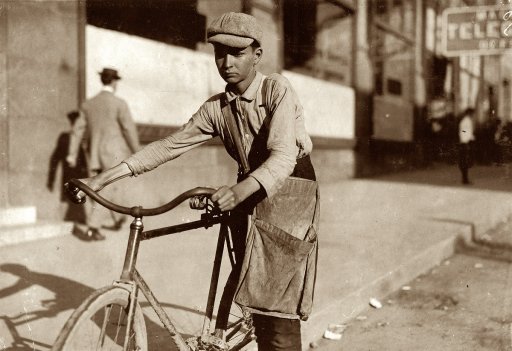
Lewis Hine caption: Jeff Miller, a young delivery boy for Magnolia Pharmacy. This is especially bad for him as he has recently returned from the Seabrook Reform School where he had spent a year. He would not tell me why he was sent there. Location: Houston, Texas, October 1913.
“Well, if that was now, they sure wouldn’t put him in a job where he was carrying drugs. I am kind of assuming that the reason he ended up in reform school was because he had to steal to eat. I think he was doing what he had to do to provide for his family, and that sounds like my grandpa. He was a survivor.” -Lillian Champagne, granddaughter of Jeff Miller
******************************
Mr. Gower: Where’s Mrs. Blaine’s box of capsules? What kind of tricks are you playing anyway? Why didn’t you deliver them right away? Don’t you know that boy’s very sick? You lazy loafer!
George Bailey: Mr. Gower, you don’t know what you’re doing. You put something wrong in those capsules. I know you’re unhappy. You got that telegram and you’re upset. You put something bad in those capsules. It wasn’t your fault, Mr. Gower. Just look and see what you did. Look at the bottle you took the powder from. It’s poison! I tell you, it’s poison! -Edited from the screenplay of It’s A Wonderful Life
In 1913, the population of Houston was about 80,000, surely more than the mythical town of Pottersville depicted in the perennial favorite It’s a Wonderful Life. According to the 1911 Houston City Directory, the Magnolia Pharmacy was located at 1621 Congress Avenue, which was in the heart of downtown. Frank Capra’s nostalgic story of small-town America, and Jimmy Stewart’s earnest portrayal of young George Bailey in the famous scene above might lead some of us to believe that the job of a drug store delivery boy was rather benign. But in 1913, Hine wanted us to believe otherwise. In one of his captions for another photograph of a drug store delivery boy, he wrote: “He works from 9:30 A.M. to 10:30 P.M. Goes to the Red Light every day and night. Says that the company could not keep other messenger boys; they work them so hard.”
According to Year Book: A Record of Events and Progress (1911): “The Seabrook School for Boys (Seabrook Reform School) was opened by the authorities of Harris County (Houston) in July, 1910. Arrangements are made by the authorities at Galveston to board delinquent boys at the Seabrook School. This school is interesting because it was organized without any state legislation or any state appropriation, under the general power of the county to care for delinquent boys coming from the juvenile courts.” The school changed its name several times before finally becoming the Harris County Boys School in 1955.
It didn’t take me long to find Jeff in the 1920 census, listed as Jeff J. Miller, about 21 years old, living with his mother and sister. His occupation was given as a railroad fireman. In the 1930 census, he is married and living with wife Bessie and two children, son Jimmie and daughter Ozella. I couldn’t immediately find Jeff in any death records, so I searched for Ozella, given her unusual name. Up popped a family history site posted by a Lillian Champagne, who identified Jeff as James Jefferson Miller. I contacted her, and she turned out to be Jeff’s granddaughter. She hadn’t seen the Hine photo, and has since posted it on her family history site.
Jeff was born in Montgomery County, Texas, on December 8, 1899. He was the son of John Thomas Miller and Pearsie Susan Simmons Miller. His father died in 1905, and his mother died in 1937. Jeff was married three times, to: Bessie Mae Haberlie (1925), Vera Viola Poteet (1937), and Lucille Ethel Blair (1970). His first two wives predeceased him. He had three children, all with Bessie. The first one, George, died at birth in 1926. Son Jimmie (called Sammy) died in 2007, and daughter Ozella died in 2009.
James Jefferson Miller died in Houston on March 12, 1980. He was 80 years old.
Edited interview with Lillian Champagne (LC), granddaughter of Jeff Miller. Interview conducted by Joe Manning (JM) on June 24, 2008.
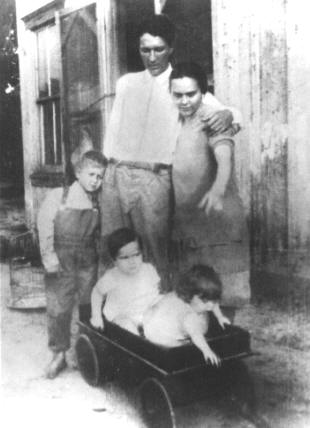
JM: How are you related to Jeff?
LC: His son Sammy was my father. He died two years ago.
JM: Had you ever seen the Lewis Hine photograph of your grandfather?
LC: No. I’m thrilled to have it. I recognized him right away. It’s a little piece of my grandfather’s life I didn’t have. It’s the only picture that I have now of him as a boy. It’s hanging on my wall.
JM: What do you think about the caption? It says, ‘This is especially bad for him as he has recently returned from the Seabrook Reform School where he had spent a year.’
LC: I didn’t know about that, but it didn’t surprise me. I knew he had a very rough life. His mother had diabetes and was sick a lot. I knew that his father was what I would call a ‘player,’ you know, with other women. Someone said that at one time, his wife threw a stick at him and told him he was no good. My mother said she thought he had an Indian wife somewhere else. He would be gone for months at a time.
JM: Hine was concerned that having a job as a delivery boy could expose Jeff to street people who would take advantage of him or get him into trouble. It was common for that to happen to messenger boys, delivery boys and newsboys.
LC: He was working for the Magnolia Pharmacy as a delivery boy, and I immediately thought, ‘Well, if that was now, they sure wouldn’t put him in a job where he was carrying drugs.’ I am kind of assuming that the reason he ended up in reform school was because he had to steal to eat.
JM: Do you know anything about the Seabrook Reform School?
LC: I had an idea that he was there, and I tried to look it up, but it doesn’t exist anymore. I have a suspicion that his mother and father were not good parents. My Aunt Sulia, who was Grandpa Jeff’s sister, said that they farmed all the kids out to homes, but she ran away from where they sent her and went back to help her mother. Then my grandpa’s father died, and his mother remarried, to a man named Anderson, and she had another child. Grandpa Jeff said he was raised by a man called Papa Theiss. I don’t know what his first name was. He lived in Houston. Apparently, after his father died and his mother was too ill to take care of her children, Papa Theiss took him in.
JM: What were his parents’ names?
LC: John Thomas Miller and Pearsie Susan (Simmons) Miller.
JM: How far did your grandfather get in school?
LC: I think the seventh or eighth grade.
JM: What did he do for a living?
LC: When he grew up, he was a mechanic for the Reed Roller Bit Company. They worked on big commercial engines. He was a very good mechanic.
JM: In the 1920 census, he is listed as a fireman for the railroad.
LC: I heard that he had worked in the oil fields.
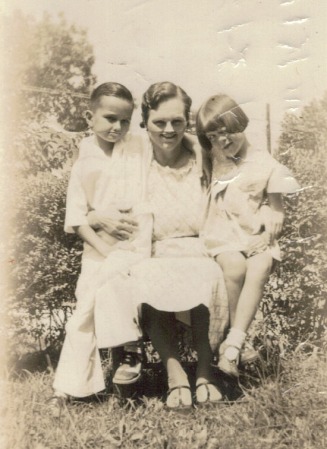
JM: When did he marry Bessie?
LC: They married on December 17, 1925. She was born in Jacksonville (Texas). Her parents owned a box company and were fairly well-to-do, and they didn’t approve of my grandfather. He and Bessie had three children. The first one died, and then there was my dad, then my aunt, and then there was a fourth pregnancy, but Bessie died of pneumonia and lost the child. That was in 1933. He remarried in 1937, to Vera Viola Poteet, also from a well-to-do family. Her parents didn’t approve of my grandfather either. They were married a long time, but they didn’t have any children. Vera was the grandmother I knew when I was growing up. She died before him. Then he married a third time, to Lucille Blair. The story was that he and Lucille knew each other before he married the first time. They had been planning on getting married, but they got into an argument, and she refused to marry him and finally married someone else. And after all those years, they got married, in 1970.
JM: Did any of his wives work?
LC: I don’t believe so. He was a member of Odd Fellows, and Vera was one of the Daughters of Rebekah in the organization. She was highly involved in that. As far as I know, she never worked. That would have been a point of pride for my grandfather. He would not have wanted any of his wives to have to work.
JM: When were you born?
LC: In 1948.
JM: What did your father do for a living?
LC: He had a military career. He lied about his age when WWII came along. He was barely 17, but he said he was older. By his third marriage, he figured out that maybe being in the Navy wasn’t good for married life, so he got out of the Navy and went into the Army. And then, when they started the Army Air Corps, he joined them. And when it became the Air Force, he joined them, and served for 20 years. He and my mom divorced a year or so after I was born. My grandmother raised me. Once she died, I went back with my father. He just died recently in Del Rio (Texas).
JM: You knew your Grandpa Jeff for 32 years. Tell me more about him.
LC: He was over six feet tall. He was a very quiet person, at least around me. He had a nice home, and I loved to go there and visit him. I didn’t see much of him when I was very young. When I was about nine, I saw the movie Heidi, where her grandfather is so gruff; so I associated my grandfather with her grandfather. The next time we went to visit, I couldn’t find him, so I asked where he was. My grandmother looked surprised, and said to me, ‘He’s out in the garage.’ I asked her, ‘Can I go see him?’ And she said, ‘Yes, at your own risk.’ So I went out there, and I asked him a lot of questions. He suddenly turned around to me and said, ‘Aren’t you scared of me?’ And I answered, ‘Oh, no, you’re like Heidi’s grandfather.’ We got along great after that. He knew I wasn’t afraid of him.
We lived at least 20 miles away from him. They lived in Cloverleaf, a suburb of Houston. We lived in Spring. His wife Vera was not a child person, but she was sweet to me. Her house was immaculate. She had handmade pillows and put them on the couch, and I loved those pillows, but you didn’t dare lean back against them, or you were in trouble. She did let me play on her piano though, tried to teach me how to read musical notes, and taught me to play ‘Chopsticks.’
Grandpa Jeff was a very ingenious person. He knew how to figure things out. He was a good problem solver. My dad told me that they lived on 27th St, in Houston, and that they were the first ones on the block to have electricity. And that’s because my grandpa got a bunch of 6-watt bulbs, wired the house, and then he hooked the wiring up to the car battery, so he would have lights at night. And that’s what they had for electricity until the city got wired.
I remember once, he had been drinking, probably beer, because I never saw him drink liquor. He was with my aunt and my grandmother and a few others. I just happened to be there when he started telling family stories. He talked about an uncle who got hanged for cattle rustling, and my grandmother and my aunt were trying to shut him up, because they didn’t want me to hear it. So I figured that it must be true, because they were telling him to shut up. I have a feeling that was on the Miller side of the family.
My father said he remembered a time when he and Grandpa Jeff had gone to get ice. In those days, he bought blocks of ice, and the ice man carried tongs on his shoulders to pick up the ice. In this instance, Grandpa Jeff and the ice man got into an argument. The ice man came after him with his tongs. So Jeff challenged him to meet in the woods the next morning to settle the matter honorably. My father said Grandpa Jeff left the house the next morning with his rifle, and four hours later, he came back home. He never said what happened, but my dad never saw the ice man again. I’ll never know what really happened, but I know in those days, it was considered honorable to have a duel, and no one would have turned my grandfather into the police.
My father also said that Grandpa Jeff and a friend used to go out deer hunting, and it didn’t matter if it was deer season or not, because they were hunting for meat for their families. Once, the game warden came by and stopped my Grandpa Jeff and started to write him a ticket. Grandpa Jeff said to the game warden, ‘How are you doing?’ He had his gun pointed in the warden’s direction. The warden let him off with a warning.
JM: I guess he was a pretty independent sort of man.
LC: So was my dad.
JM: Can you see any connection to the Jeff Miller in the picture, and the Grandpa Jeff that you knew?
LC: Yes. I think he was doing what he had to do to provide for his family, and that sounds like my grandpa. He was a survivor. What saved his life was Papa Theiss. He believed in hard work and being a responsible person. I think that’s where my grandfather got his ideals from. He died on March 12, 1980. He was 80. I was living in California by then. But we were still close. I named one of my children after him, which thrilled him beyond belief.
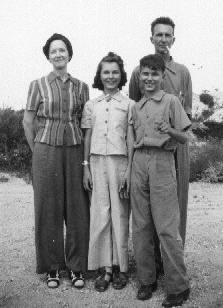
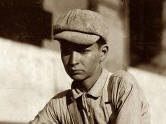
*Story published in 2010.